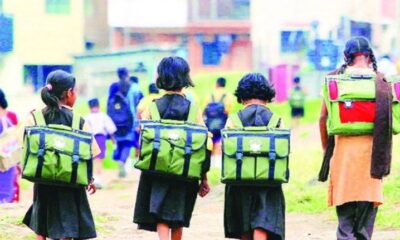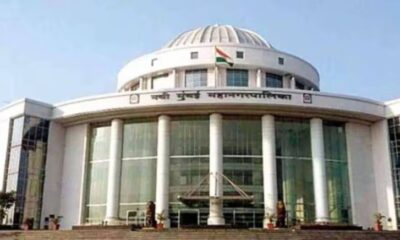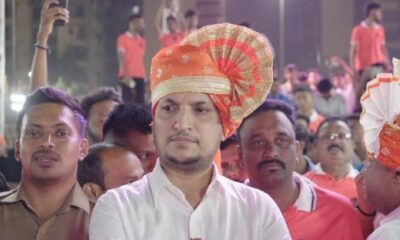Latest News
The Health Department of NMMC Starts a Vigorous Mosquito Control Initiative in Navi Mumbai
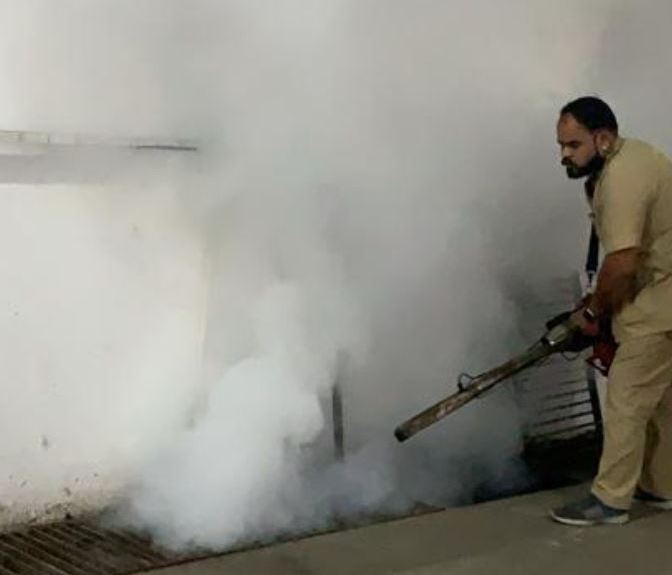
A Intensive Mosquito Control Campaign was launched by NMMC in Navi Mumbai.
The Campaign
The health department of the Navi Mumbai Municipal Corporation (NMMC) has started an extensive chemical fumigation and mosquito repellent spraying operation throughout its jurisdiction. The official states that the goal of this coordinated effort is to stop the spread of mosquitoes. According to the official, “the initiative is a response to the concerning surge in mosquito density during the winter period, particularly in the creek area and surrounding marshy regions.”
With the knowledgeable direction of Municipal Commissioner Rajesh Narvekar, a comprehensive plan has been implemented that will run from November 1, 2023, to February 24, 2024. The program includes a number of crucial steps to properly tackle the mosquito threat. Every Thursday, health assistants supervise nightly mosquito density surveys at the Civil Primary Health Center level in the Navi Mumbai Municipal Corporation region in order to enable comprehensive monitoring.
Additionally, in addition to the routine nightly fumigation that takes place at the Civilian Primary Health Center from November to February, morning fumigation operations have started. This program, which is overseen by the Medical Officer and is carried out by Health Assistants, operates from 5:30 to 6:00 p.m. and carefully follows the timetable for fillings.
As the Health Department works diligently to reduce the number of mosquitoes, the public is urged to assist and collaborate with the committed personnel who work in their particular regions. In order to ensure that everyone works together to successfully protect public health throughout this campaign, people are also asked to report any issues or grievances they may have with fumigation by getting in touch with the closest Civil Primary Health Center, the official added.
Latest News
Navi Mumbai Cancels Invitations to Newly Elected Corporators for Republic Day Ceremonies
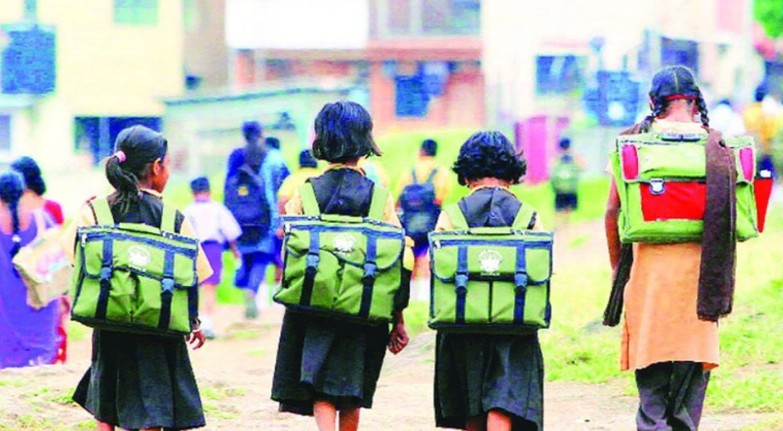
School principals to hoist the national flag following administrative delays.
The Flag Hoisting
The Navi Mumbai Municipal Corporation (NMMC) has cancelled invitations extended to newly elected corporators for Republic Day flag-hoisting ceremonies in civic schools this year, citing administrative and procedural delays.
Although the municipal elections have concluded, the first general body meeting of the newly elected corporators is yet to take place. In view of this, the NMMC education department has issued revised instructions for the January 26 celebrations across all municipal schools. As per the new directive, school principals will themselves conduct the flag-hoisting ceremonies, and corporators will not be invited to preside over the events.
Officials clarified that any earlier circulars or communications instructing schools to invite corporators should be treated as cancelled. In cases where invitation letters have already been sent, school principals have been directed to inform the concerned corporators about the revised decision and explain the administrative reasons behind the change.
The move has been described as a temporary arrangement until formal procedures related to the newly elected body are completed. The education department has emphasized that the decision is purely administrative and not political in nature.
Despite the change, the NMMC has instructed all schools to ensure that Republic Day celebrations are conducted with full enthusiasm, discipline and respect for national values. Principals have been asked to strictly adhere to the guidelines and ensure smooth conduct of the programme.
The decision has drawn attention as it comes soon after the municipal elections, highlighting the impact of procedural delays on official civic events.
Latest News
1111-Feet Tricolor Yatra Fills Navi Mumbai with Patriotic Zeal
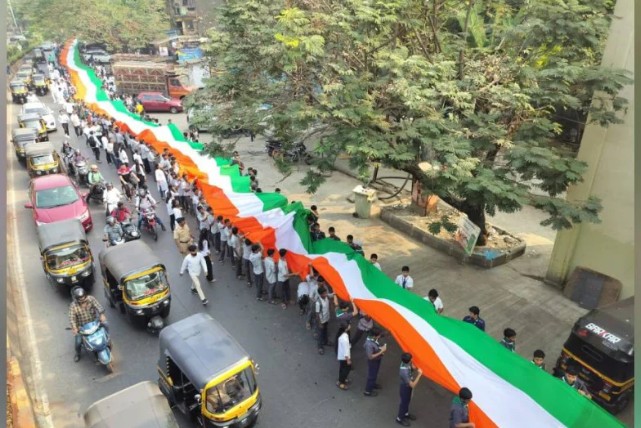
ABVP initiative sees thousands of students participate spontaneously ahead of Republic Day.
The Initiative
Patriotic fervour gripped Navi Mumbai as the Akhil Bharatiya Vidyarthi Parishad (ABVP) organised a massive 1,111-feet-long Tricolor Yatra, witnessing spontaneous participation from thousands of students and citizens on the eve of Republic Day.
The yatra was held as part of Youth Week celebrations and to mark the birth anniversary of Netaji Subhas Chandra Bose, with the objective of inspiring nationalism, unity and social responsibility among the youth. Students marched proudly while holding the enormous national flag, raising slogans such as “Bharat Mata Ki Jai,” “Vande Mataram” and “Jai Hind,” creating an atmosphere charged with patriotic emotion.
The rally began at Blue Diamond Chowk, Vashi, and culminated at Rajiv Gandhi College of Arts, Commerce and Science, Sector 10A, where a short programme was organised. Speakers highlighted the role of students in nation-building and appealed to the youth to actively contribute to society beyond academics.
Prominent attendees included ABVP state minister Rahul Rajoria, sports coordinator Arpita Malik, and college principal Dr Basukinath Pandey, who praised the enthusiasm and discipline shown by the participants. They urged students to uphold constitutional values and remain socially responsible citizens.
The event’s smooth execution was attributed to the efforts of Dr Akshay Shet and more than 100 volunteers. Participants and local residents said the Tricolor Yatra strengthened the sense of unity and national pride, making it a memorable and inspiring pre-Republic Day event for Navi Mumbai.
Latest News
Garbage Piles Become Major Issue Ahead of Uran Elections
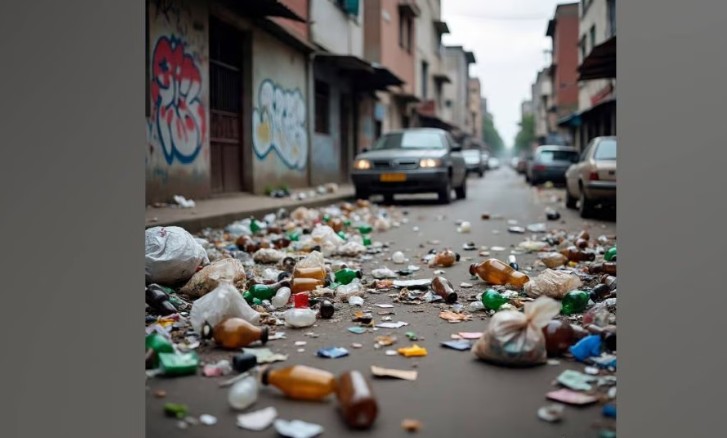
With the Uran civic elections approaching, local residents and political observers are raising serious concerns about the persistent garbage problem across the area. Overflowing waste on main roads and traffic lanes has emerged as a key issue in the election campaign, with voters expressing frustration over poor civic management.
Several key thoroughfares in Uran, especially around busy intersections and residential localities, have been seen strewn with garbage that has not been collected for days. Piles of waste are causing traffic disruptions, foul odour and unhygienic conditions, prompting complaints from commuters, shopkeepers and local residents.
Civic activists and opposition leaders have criticised the local administration for its failure to ensure regular garbage collection and proper waste disposal. They say that poor sanitation has not only affected the appearance of the town but also posed health risks, especially during peak summer months.
Residents pointed out that despite repeated assurances from officials, garbage is frequently left uncollected in several areas, leading to water logging and breeding of insects. Many voters have highlighted this issue as a priority concern affecting their daily lives and have demanded immediate action from authorities.
Political parties contesting the Uran elections have responded by promising stricter monitoring of waste collection, improvement in street cleaning, and deployment of more resources for solid waste management.
As election day approaches, garbage disposal and civic cleanliness have become central themes in public discussions, reflecting growing citizen demand for improved basic services and accountable governance.
-

 Fact Check5 years ago
Fact Check5 years agoNidhi Razdan, fake Harvard professorship, and here is the explanation through her blog.
-

 India4 years ago
India4 years agoAs the arrangement with Prashant Kishor falls through Rahul Gandhi has gone overseas again and is uncontactable
-

 Technology4 years ago
Technology4 years agoBSNL reveals all new 4G plans starting at ₹16
-

 Latest News5 years ago
Latest News5 years agoGovernment has spent ₹9,725 crores on Covid-19 vaccination drive so far
-

 Latest News4 years ago
Latest News4 years agoTata wins Air India with ₹18,000 crore bid
-

 Latest News4 years ago
Latest News4 years agoJharkhand government cuts Petrol price by massive ₹25 a litre but with a catch
-

 Latest News5 years ago
Latest News5 years agoRaj Kundra Gave ₹25 Lakh Bribe to Mumbai Crime Branch to Avoid Arrest
-

 Navi Mumbai5 years ago
Navi Mumbai5 years agoNavi Mumbai civic body raids and tests morning walkers, many found COVID positive

